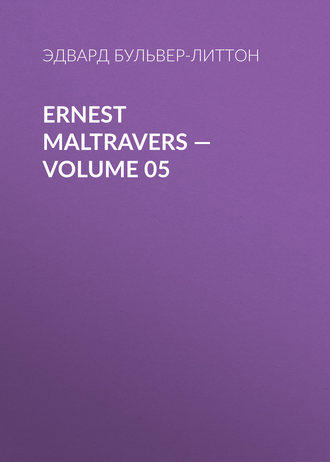
Эдвард Бульвер-Литтон
Ernest Maltravers — Volume 05
"Satire!"
"Yes; more than one of your poets made their way by a satire, and Cesarini is persuaded he shall do the same. Castruccio is not as far-sighted as his namesake, the Prince of Lucca. Good night, my dear Ernest."
CHAPTER VI
"When with much pains this boasted learning's got,
'Tis an affront to those who have it not."
CHURCHILL: /The Author/.
THERE was something in De Montaigne's conversation, which, without actual flattery, reconciled Maltravers to himself and his career. It served less, perhaps, to excite than to sober and brace his mind. De Montaigne could have made no man rash, but he could have made many men energetic and persevering. The two friends had some points in common; but Maltravers had far more prodigality of nature and passion about him—had more of flesh and blood, with the faults and excellences of flesh and blood. De Montaigne held so much to his favourite doctrine of moral equilibrium, that he had really reduced himself in much to a species of clockwork. As impulses are formed from habits, so the regularity of De Montaigne's habits made his impulses virtuous and just, and he yielded to them as often as a hasty character might have done; but then those impulses never urged to anything speculative or daring. De Montaigne could not go beyond a certain defined circle of action. He had no sympathy for any reasonings based purely on the hypotheses of the imagination: he could not endure Plato, and he was dumb to the eloquent whispers of whatever was refining in poetry or mystical in wisdom.
Maltravers, on the contrary, not disdaining Reason, ever sought to assist her by the Imaginative Faculty, and held all philosophy incomplete and unsatisfactory that bounded its inquiries to the limits of the Known and Certain. He loved the inductive process; but he carried it out to Conjecture as well as Fact. He maintained that, by a similar hardihood, all the triumphs of science, as well as art, had been accomplished—that Newton, that Copernicus, would have done nothing if they had not imagined as well as reasoned, guessed as well as ascertained. Nay, it was an aphorism with him, that the very soul of philosophy is conjecture. He had the most implicit confidence in the operations of the mind and the heart properly formed, and deemed that the very excesses of emotion and thought, in men well trained by experience and study, are conducive to useful and great ends. But the more advanced years, and the singularly practical character of De Montaigne's views, gave him a superiority in argument over Maltravers which the last submitted to unwillingly. While, on the other hand, De Montaigne secretly felt that his young friend reasoned from a broader base, and took in a much wider circumference; and that he was, at once, more liable to failure and error, and more capable of new discovery and of intellectual achievement. But their ways in life being different, they did not clash; and De Montaigne, who was sincerely interested in Ernest's fate, was contented to harden his friend's mind against the obstacles in his way, and leave the rest to experiment and to Providence. They went up to London together: and De Montaigne returned to Paris. Maltravers appeared once more in the haunts of the gay and great. He felt that his new character had greatly altered his position. He was no longer courted and caressed for the same vulgar and adventitious circumstances of fortune, birth, and connections, as before—yet for circumstances that to him seemed equally unflattering. He was not sought for his merit, his intellect, his talents; but for his momentary celebrity. He was an author in fashion, and run after as anything else in fashion might have been. He was invited, less to be talked to than to be stared at. He was far too proud in his temper, and too pure in his ambition, to feel his vanity elated by sharing the enthusiasm of the circles with a German prince or an industrious flea. Accordingly he soon repelled the advances made to him, was reserved and supercilious to fine ladies, refused to be the fashion, and became very unpopular with the literary exclusives. They even began to run down the works, because they were dissatisfied with the author. But Maltravers had based his experiments upon the vast masses of the general Public. He had called the PEOPLE of his own and other countries to be his audience and his judges; and all the coteries in the world could have not injured him. He was like the member for an immense constituency, who may offend individuals, so long as he keep his footing with the body at large. But while he withdrew himself from the insipid and the idle, he took care not to become separated from the world. He formed his own society according to his tastes: took pleasure in the manly and exciting topics of the day; and sharpened his observation and widened his sphere as an author, by mixing freely and boldly with all classes as a citizen. But literature became to him as art to the artist—as his mistress to the lover—an engrossing and passionate delight. He made it his glorious and divine profession—he loved it as a profession—he devoted to its pursuits and honours his youth, cares, dreams—his mind, and his heart, and his soul. He was a silent but intense enthusiast in the priesthood he had entered. From LITERATURE he imagined had come all that makes nations enlightened and men humane. And he loved Literature the more, because her distinctions were not those of the world—because she had neither ribbands, nor stars, nor high places at her command. A name in the deep gratitude and hereditary delight of men—this was the title she bestowed. Hers was the Great Primitive Church of the world, without Popes or Muftis—sinecures, pluralities and hierarchies. Her servants spoke to the earth as the prophets of old, anxious only to be heard and believed. Full of this fanaticism, Ernest Maltravers pursued his way in the great procession of the myrtle-bearers to the sacred shrine. He carried the thyrsus, and he believed in the god. By degrees his fanaticism worked in him the philosophy which De Montaigne would have derived from sober calculation; it made him indifferent to the thorns in the path, to the storms in the sky. He learned to despise the enmity he provoked, the calumnies that assailed him. Sometimes he was silent, but sometimes he retorted. Like a soldier who serves a cause, he believed that when the cause was injured in his person, the weapons confided to his hands might be wielded without fear and without reproach. Gradually he became feared as well as known. And while many abused him, none could contemn.
It would not suit the design of this work to follow Maltravers step by step in his course. I am only describing the principal events, not the minute details, of his intellectual life. Of the character of his works it will be enough to say that, whatever their faults, they were original—they were his own. He did not write according to copy, nor compile from commonplace books. He was an artist, it is true,—for what is genius itself but art? but he took laws, and harmony, and order, from the great code of Truth and Nature: a code that demands intense and unrelaxing study—though its first principles are few and simple: that study Maltravers did not shrink from. It was a deep love of truth that made him a subtle and searching analyst, even in what the dull world considers trifles; for he knew that nothing in literature is in itself trifling—that it is often but a hairsbreadth that divides a truism from a discovery. He was the more original, because he sought rather after the True than the New. No two minds are ever the same; and therefore any man who will give us fairly and frankly the results of his own impressions, uninfluenced by the servilities of imitation, will be original. But it was not from originality, which really made his predominant merit, that Maltravers derived his reputation, for his originality was not of that species which generally dazzles the vulgar—it was not extravagant nor /bizarre/—he affected no system and no school. Many authors of his day seemed more novel and /unique/ to the superficial. Profound and durable invention proceeds by subtle and fine gradations—it has nothing to do with those jerks and starts, those convulsions and distortions, which belong not to the vigour and health, but to the epilepsy and disease, of Literature.
CHAPTER VII
"Being got out of town, the first thing I did was to give my mule her head."
—/Gil Blas/.
ALTHOUGH the character of Maltravers was gradually becoming more hard and severe,—although as his reason grew more muscular, his imagination lost something of its early bloom, and he was already very different from the wild boy who had set the German youths in a blaze, and had changed into a Castle of Indolence the little cottage tenanted with Poetry and Alice,—he still preserved many of his old habits; he loved, at frequent intervals, to disappear from the great world—to get rid of books and friends, and luxury and wealth, and make solitary excursions, sometimes on foot, sometimes on horseback, through this fair garden of England.
It was one soft May-day that he found himself on such an expedition, slowly riding through one of the green lanes of ———shire. His cloak and his saddle-bags comprised all his baggage, and the world was before him "where to choose his place of rest." The lane wound at length into the main road, and just as he came upon it he fell in with a gay party of equestrians.
Foremost of its cavalcade rode a lady in a dark green habit, mounted on a thoroughbred English horse, which she managed with so easy a grace that Maltravers halted in involuntary admiration. He himself was a consummate horseman, and he had the quick eye of sympathy for those who shared the accomplishment. He thought, as he gazed, that he had never seen but one woman whose air and mien on horseback were so full of that nameless elegance which skill and courage in any art naturally bestow—that woman was Valerie de Ventadour. Presently, to his great surprise, the lady advanced from her companions, neared Maltravers, and said, in a voice which he did not at first distinctly recognise—" Is it possible?—do I see Mr. Maltravers?"
She paused a moment, and then threw aside her veil, and Ernest beheld—Madame de Ventadour! By this time a tall, thin gentleman had joined the Frenchwoman.
"Has /madame/ met with an acquaintance?" said he; "and, if so, will she permit me to partake her pleasure?"
The interruption seemed a relief to Valerie;—she smiled and coloured.
"Let me introduce you to Mr. Maltravers. Mr. Maltravers, this is my host, Lord Doningdale."
The two gentlemen bowed, the rest of the cavalcade surrounded the trio, and Lord Doningdale, with a stately yet frank courtesy, invited Maltravers to return with the party to his house, which was about four miles distant. As may be supposed, Ernest readily accepted the invitation. The cavalcade proceeded, and Maltravers hastened to seek an explanation from Valerie. It was soon given. Madame de Ventadour had a younger sister, who had lately married a son of Lord Doningdale. The marriage had been solemnized in Paris, and Monsieur and Madame de Ventadour had been in England a week on a visit to the English peer.
The /rencontre/ was so sudden and unexpected that neither recovered sufficient self-possession for fluent conversation. The explanation given, Valerie sank into a thoughtful silence, and Maltravers rode by her side equally taciturn, pondering on the strange chance which, after the lapse of years, had thrown them again together.
Lord Doningdale, who at first lingered with his other visitors, now joined them, and Maltravers was struck with his high-bred manner, and a singular and somewhat elaborate polish in his emphasis and expression. They soon entered a noble park, which attested far more care and attention than are usually bestowed upon those demesnes, so peculiarly English. Young plantations everywhere contrasted the venerable groves—new cottages of picturesque design adorned the outskirts—and obelisks and columns, copied from the antique, and evidently of recent workmanship, gleamed upon them as they neared the house—a large pile, in which the fashion of Queen Anne's day had been altered into the French roofs and windows of the architecture of the Tuileries. "You reside much in the country, I am sure, my lord," said Maltravers.
"Yes," replied Lord Doningdale, with a pensive air, "this place is greatly endeared to me. Here his Majesty Louis XVIII., when in England, honoured me with an annual visit. In compliment to him, I sought to model my poor mansion into an humble likeness of his own palace, so that he might as little as possible miss the rights he had lost. His own rooms were furnished exactly like those he had occupied at the Tuileries. Yes, the place is endeared to me—I think of the old times with pride. It is something to have sheltered a Bourbon in his misfortunes."
"It cost /milord/ a vast sum to make these alterations," said Madame de Ventadour, glancing archly at Maltravers.
"Ah, yes," said the old lord; and his face, lately elated, became overcast—"nearly three hundred thousand pounds: but what then?—'Les souvenirs, madame, sont sans prix/!'"
"Have you visited Paris since the restoration, Lord Doningdale," asked Maltravers.
His lordship looked at him sharply, and then turned his eye to Madame de Ventadour.
"Nay," said Valerie; laughing, "I did not dictate the question."
"Yes," said Lord Doningdale, "I have been at Paris."
"His Majesty must have been delighted to return your lordship's hospitality."
Lord Doningdale looked a little embarrassed, and made no reply, but put his horse into a canter.
"You have galled our host," said Valerie, smiling. "Louis XVIII. and his friends lived here as long as they pleased, and as sumptuously as they could; their visits half ruined the owner, who is the model of a /gentilhomme/ and /preux chevalier/. He went to Paris to witness their triumph; he expected, I fancy, the order of the St. Esprit. Lord Doningdale has royal blood in his veins. His Majesty asked him once to dinner, and, when he took leave, said to him, 'We are happy, Lord Doningdale, to have thus requited our obligations to your lordship.' Lord Doningdale went back in dudgeon, yet he still boasts of his /souvenirs/, poor man."
"Princes are not grateful, neither are republics," said Maltravers.
"Ah, who is grateful," rejoined Valerie, "except a dog and a woman?"
Maltravers found himself ushered into a vast dressing-room, and was informed, by a French valet, that in the country Lord Doningdale dined at six—the first bell would ring in a few minutes. While the valet was speaking, Lord Doningdale himself entered the room. His lordship had learned, in the meanwhile, that Maltravers was of the great and ancient commoner's house whose honours were centred in his brother; and yet more, that he was the Mr. Maltravers whose writings every one talked of, whether for praise or abuse. Lord Doningdale had the two characteristics of a high-bred gentleman of the old school—respect for birth and respect for talent; he was, therefore, more than ordinarily courteous to Ernest, and pressed him to stay some days with so much cordiality, that Maltravers could not but assent. His travelling toilet was scanty, but Maltravers thought little of dress.







